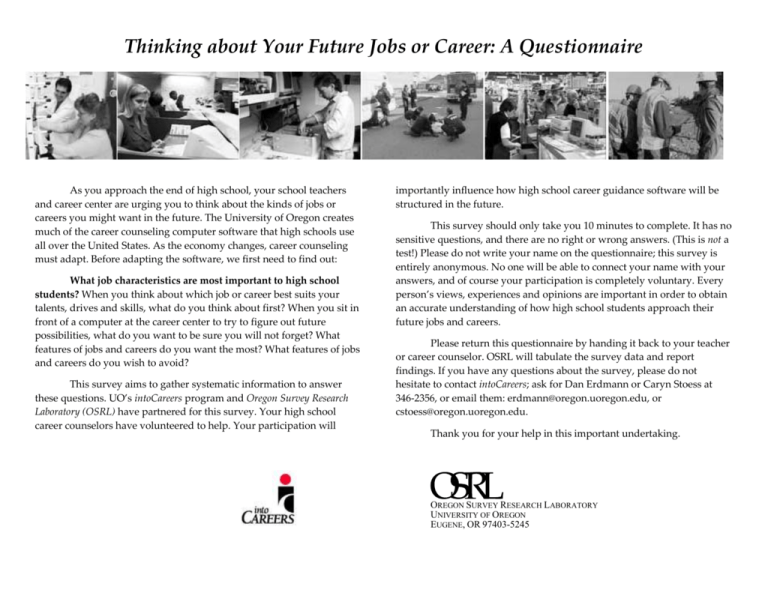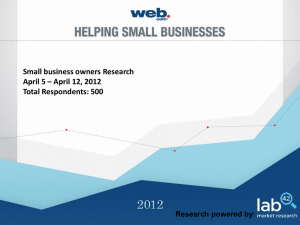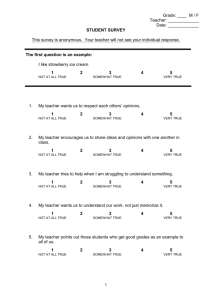Careers questionnaire - Scholars` Bank
advertisement

Thinking about Your Future Jobs or Career: A Questionnaire As you approach the end of high school, your school teachers and career center are urging you to think about the kinds of jobs or careers you might want in the future. The University of Oregon creates much of the career counseling computer software that high schools use all over the United States. As the economy changes, career counseling must adapt. Before adapting the software, we first need to find out: What job characteristics are most important to high school students? When you think about which job or career best suits your talents, drives and skills, what do you think about first? When you sit in front of a computer at the career center to try to figure out future possibilities, what do you want to be sure you will not forget? What features of jobs and careers do you want the most? What features of jobs and careers do you wish to avoid? This survey aims to gather systematic information to answer these questions. UO’s intoCareers program and Oregon Survey Research Laboratory (OSRL) have partnered for this survey. Your high school career counselors have volunteered to help. Your participation will importantly influence how high school career guidance software will be structured in the future. This survey should only take you 10 minutes to complete. It has no sensitive questions, and there are no right or wrong answers. (This is not a test!) Please do not write your name on the questionnaire; this survey is entirely anonymous. No one will be able to connect your name with your answers, and of course your participation is completely voluntary. Every person’s views, experiences and opinions are important in order to obtain an accurate understanding of how high school students approach their future jobs and careers. Please return this questionnaire by handing it back to your teacher or career counselor. OSRL will tabulate the survey data and report findings. If you have any questions about the survey, please do not hesitate to contact intoCareers; ask for Dan Erdmann or Caryn Stoess at 346-2356, or email them: erdmann@oregon.uoregon.edu, or cstoess@oregon.uoregon.edu. Thank you for your help in this important undertaking. OREGON SURVEY RESEARCH LABORATORY UNIVERSITY OF OREGON EUGENE, OR 97403-5245 Thinking about Your Future Jobs or Career: A Questionnaire Below you will find fifty typical “job characteristics” and descriptions of what these might mean in everyday life on a job. Please give a quick, gut-level answer saying whether each job characteristic is important to you - yes or no. If you circle “yes”, then please mark whether it is “very important” or “somewhat important” to you in the next column; if you circle “no”, just go to the next item. Please answer each item. We expect you will find 10-20 items below that you will want to know about when exploring jobs and careers. You might find some items Job characteristic What this may mean in real life on the job: that you definitely do not want in a future job or career. For those, please check the box in the far right column “I do not want this in a job”. You do not need to know “what you want to be when you grow up” to answer these questions. Just answer with what is important to you now. If do not understand an item, or part of it, or if you are not sure, feel free to make comments in the margins or on a separate page. We will read your comments and take them into account. Remember, this is not a test! We just need to know which job characteristics are important to you now. Thanks! When exploring jobs or a career, is it important for you to know… Circle one for each Advancement opportunities Analytical thinking Some jobs require workers to attend to details carefully and make sure they complete all tasks. Some jobs keep workers busy all day. In other jobs, workers sometimes need to wait to do their tasks. In some jobs, workers can move to a higher job if they perform their tasks well. In some jobs, workers evaluate information and use logic to analyze and solve problems. Annual job outlook Some jobs offer little or no work for part of the year, due to holiday seasons, bad weather, or varying demand for skills. whether a job offers steady employment? No Yes Artistic In some jobs workers design or create interesting things and express themselves in music, pictures, dance, or building design. whether a job requires artistic ability? No Yes Care for people In some jobs, workers give medical or emotional attention to people. whether a job involves caring for people? No Yes Accuracy and details Activity In some jobs, workers compare sets of letters, numbers, objects, Check accuracy pictures, or patterns, and then note when they do not match. In some jobs, workers train and encourage people to improve skills or Coaching knowledge. This applies to athletics but also to other fields. the level of accuracy and detail required? No Yes the job’s general activity level? No Yes the chances of advancing to a higher job? No Yes the level of analytical thinking required? No Yes whether a job involves checking accuracy? No Yes whether a job involves coaching? No Yes Communication Some jobs require workers to clearly speak or write information. the level of communication required? No Yes Community service whether a job serves the community? No Yes Enterprise Flexible hours Health and safety In some jobs, workers provide services and programs in places to help people. Some jobs give workers chances to take risks, such as starting up and carrying out new projects, activities, or ideas. Some jobs do not have rigid work schedules. Other jobs require working 9 a.m. -5 p.m., Monday through Friday. Some jobs need workers to care for people who are sick, hurt, in danger, or need protection. Income and pay Some jobs pay workers a lot of money. Other jobs pay modestly, and if a job offers enterprising opportunities? No Yes how flexible working hours will be? No Yes if a job involves health and safety? No Yes If "Yes": How important is it to you? Very important Somewhat important Very important Somewhat important Very important Somewhat important Very important Somewhat important Very important Somewhat important Very important Somewhat important Very important Somewhat important Very important Somewhat important Very important Somewhat important Very important Somewhat important Very important Somewhat important Very important Somewhat important Very important Somewhat important Very important Somewhat important how much a job pays? No Yes Very important I do not want this in a job Somewhat important still others pay little. Job characteristic What this may mean in real life on the job: When exploring jobs or a career, is it important for you to know… Some jobs allow workers to do their tasks in their own way with little how much independence workers have? direction. In other jobs, supervisors tell workers what to do. Some jobs need workers indoors nearly all day. Other jobs need Indoors vs. whether a job requires outdoor work? workers outdoors most or all of the day. outdoors Some jobs need workers to find and select information that fits a task. Information if a job includes finding information? Other jobs give workers all the information they need. gathering Some jobs require four or more years of college. Other jobs require a Length of the amount of training needed to qualify? few hours of on-the-job training. Most jobs are between these two. training Some jobs need workers to listen to what people say and ask Listening whether a job requires listening skills? questions when needed. Long-term job Some jobs need more workers because that part of the economy is if the need for workers will increase or growing. Other jobs are declining so fewer workers are needed. outlook decrease? Some jobs require workers to know the tools and processes needed to Maintain and if a job involves maintaining and repairing keep machinery and equipment running, or to fix it when broken. repair things equipment? Some jobs require workers to use their hands to pick up, move, or put Manual whether a job requires hand skills? together objects. This is different from the finger skills needed to type. dexterity Some jobs require workers to select correct math formulas or methods Math whether a job uses math? from accounting, geometry, or statistics to solve problems or to plan. Operate In some jobs, workers drive or navigate vehicles such as forklifts, if a job involves operating vehicles? vehicles trucks, boats, or planes. In some jobs, workers use or control machines, for example, to make Operate if a job includes operating machines? plastic, paper, food products, cloth, or clothing. machines In some jobs, workers schedule and coordinate events, programs, and Organize if a job involves organizing events? activities for groups of people. In some jobs, workers try to convince people to change their minds or Persuasion if a job includes persuading people? their behavior. Some jobs require physical activity, like walking, climbing, or lifting. Physical activity how much physical activity is needed? Other jobs require sitting or standing in one place most of the time. Workers in some jobs are admired, honored, and respected by people Prestige whether people consider a job prestigious? in their organization or community. Plants, animals, In some jobs, workers work with or care for plants and animals, or if a job includes working with plants, help protect the environment. and nature. animals, or the natural world? In some jobs, workers identify problems, review related information, Problem solving develop and implement solutions. whether a job involves problem solving? Provide advice In some jobs, workers discuss topics with individuals or groups, and whether a job involves advising others? & consultation then guide, suggest, or recommend options or solutions. In some jobs, workers deal directly with the public, such as greeting Public if a job involves working with the public? or serving customers. interaction Some jobs require workers to look at and understand written words Reading the amount and level of reading required? and information. Independence Circle one for each No Yes No Yes No Yes No Yes No Yes No Yes No Yes No Yes No Yes No Yes No Yes No Yes No Yes No Yes No Yes No Yes No Yes No Yes No Yes No Yes If "Yes": How important is it to you? Very important Somewhat important Very important Somewhat important Very important Somewhat important Very important Somewhat important Very important Somewhat important Very important Somewhat important Very important Somewhat important Very important Somewhat important Very important Somewhat important Very important Somewhat important Very important Somewhat important Very important Somewhat important Very important Somewhat important Very important Somewhat important Very important Somewhat important Very important Somewhat important Very important Somewhat important Very important Somewhat important Very important Somewhat important Very important Somewhat important I do not want this in a job Resolve conflict Some jobs bring people together to try to settle their differences or and negotiate disputes. Job characteristic Responsibility Sell things Shift work What this may mean in real life on the job: Some jobs require a worker to be accountable for final products or services, which result from many workers’ activities. In some jobs, workers try to convince others to buy goods or services. Some jobs require night or evening work, at least some of the time. Some jobs have high levels of pressure, anxiety, or importance for a long time. In other jobs, workers rarely experience high stress. In some jobs, workers guide, direct, encourage, and evaluate other Supervise people’s work, including hiring and firing. In some jobs, workers teach others how to do things, and they teach Teach others in systematic and structured ways. Some jobs require workers to come up with unusual or clever ideas Think creatively about a topic or develop new ways to solve problems. Some jobs require frequent travel away from home for one or more nights per week. Other jobs require daily travel, but workers go Travel home every day. Yet other jobs require travel rarely. Some jobs can be found only in large cities, and some jobs occur Urban or rural only in rural areas. Many jobs can be found everywhere. Some jobs require workers to use scientific rules and methods to Use science solve problems or create new knowledge. if a job involves resolving conflicts and Very important No Yes negotiating? Somewhat important When exploring jobs or a career, is it important for you to know… how much responsibility a job involves? No Yes whether a job includes selling? No Yes whether a job requires unusual work hours? No Yes a job’s stress level? No Yes Stress Variety In some jobs, workers do different tasks almost every day. Work conditions Work with abstract ideas Work with children Some jobs expose workers to heat, cold, odors, or other unpleasant conditions. In other jobs, the work environment is protected. Some jobs require workers to analyze concepts, test hypotheses, or create theories. In some jobs, workers teach or care for children. Other jobs have nothing to do with children. If you could have any job or career you wanted, which two job characteristics above would be most important to you? Circle one for each. whether a job involves supervising people? No Yes whether a job includes teaching? No Yes whether a job involves creative thinking? No Yes the amount and kind of travel required? No Yes the job’s location? No Yes whether a job uses science? No Yes whether a job has variety? No Yes the type of work conditions? No Yes whether a job involves abstract ideas? No Yes whether a job involves work with children? No Yes If "Yes": How important is it to you? Very important Somewhat important Very important Somewhat important Very important Somewhat important Very important Somewhat important Very important Somewhat important Very important Somewhat important Very important Somewhat important Very important Somewhat important Very important Somewhat important Very important Somewhat important Very important Somewhat important Very important Somewhat important Very important Somewhat important Very important Somewhat important Most important: 2. _________________________________ I do not want this in a job Are any other job characteristics important to you that we did not list above? (Please circle yes or no.) No Most important: 1. _________________________________ Yes What are those? _____________________________ __________________________________________________ Thank you for your help in answering these questions!







